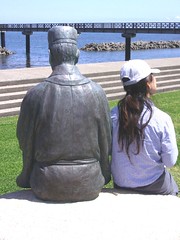Learning by teaching, teaching by learning
 I took up a demonstrating job at the same time as I started my PhD this year. Teaching itself is very new to me. I love the element of teaching, namely standing up in front of people and taking the central stage (just kidding). Public speaking is said to be the worst fear for most people (worse than death sometimes). The challenge for me, however, lies not in standing in front of people but in explaining, commanding, and entertaining in English which makes sense for everyone.
I took up a demonstrating job at the same time as I started my PhD this year. Teaching itself is very new to me. I love the element of teaching, namely standing up in front of people and taking the central stage (just kidding). Public speaking is said to be the worst fear for most people (worse than death sometimes). The challenge for me, however, lies not in standing in front of people but in explaining, commanding, and entertaining in English which makes sense for everyone.In the lab, I have to explain concepts and terms which are fundamental knowledge in psychology. Students are to get taste of different areas of psychology and decide which area they want to go into or even whether they want to keep psychology as their major or minor. Hence, the future of the psychology department is on our demonstrators' shoulders (well, a portion of it). Anyway, I take this job very seriously, partly because I don't want to disadvantage or discourage my students to study a fascinating subject, and partly because teaching teaches me a lot of things I haven't fully understood myself.
I'm experiencing first hand that knowing a subject (or thinking that you know it well) is one thing, but explaining it in a concise and comprehensible manner is entirely another thing. After living in an English-speaking country for over 7 years, I don't have much difficulty in conversing in daily life, but teaching a lab requires a different kind of communication skill. I sit at an experienced demonstrator’s lab every week. Although it's not compulsory, it's a vital lesson for me as we don't get other means of training. The demonstrator is a superb teacher in my eyes. His wide use of vocabulary amazes me each time. He is really good at capturing students' attention and creating a lively atmosphere. His explanation is clear and to the point. I have to tell myself the usual mantra "I have two more years to catch up with him, since he's been teaching for three years." This is the sort of mantra I tell myself whenever I fall into a trap of comparing myself with someone who is superior (this is called upward social comparison in psychology term, by the way). This always works for me. If you know some other magic wands, let me know.


0 Comments:
Post a Comment
<< Home